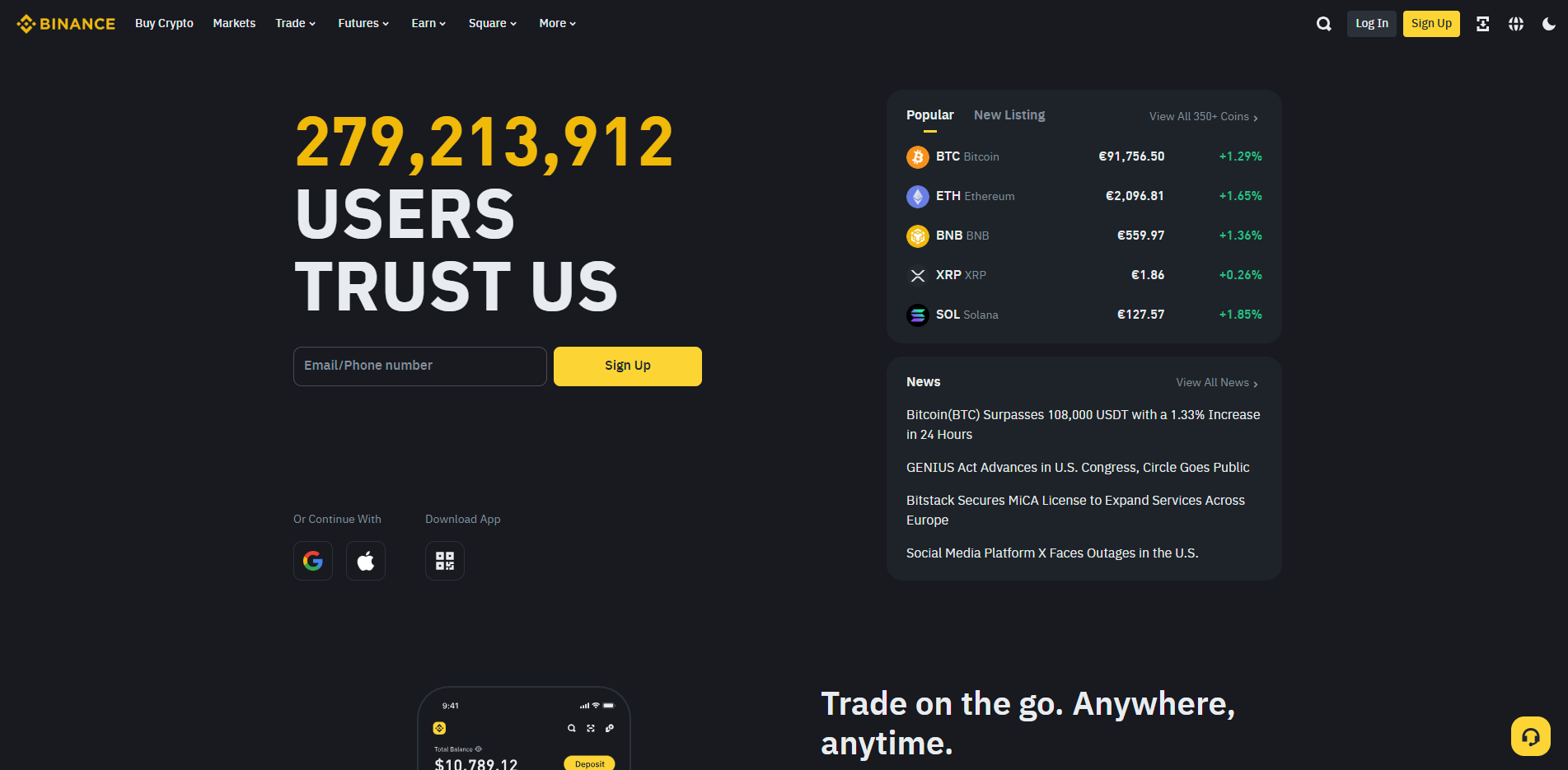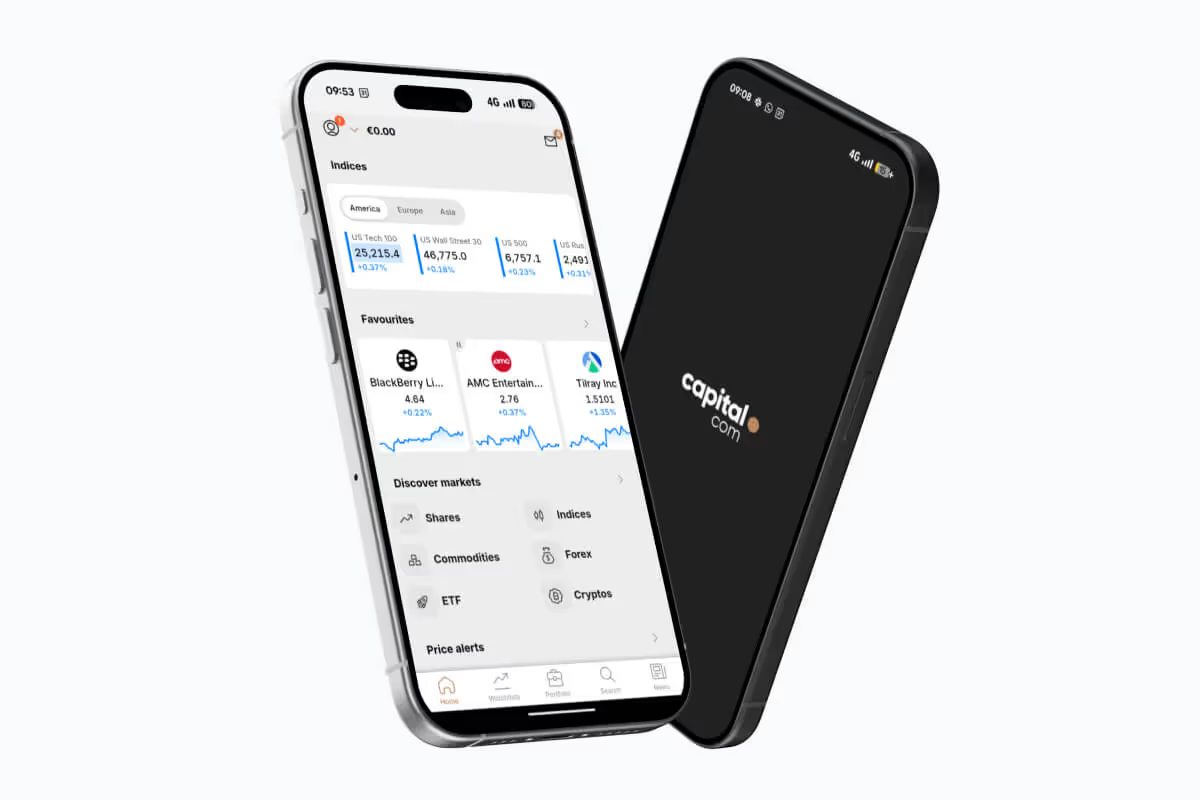Best crypto exchanges in Europe in 2026



The cryptocurrency market has been gaining traction in Europe, but with so many options and different platforms, it's natural to feel some hesitation when choosing the best place to start. Selecting a reliable cryptocurrency exchange is essential to ensure that you buy, sell, and manage your crypto assets safely and efficiently.
Whether it's your first experience acquiring Bitcoin or building a crypto portfolio with various coins, a good exchange will facilitate deposits, trades, and withdrawals while also providing support and analytical tools.
In this article, you'll discover the five best cryptocurrency exchanges in Europe and explore traditional brokers that also offer crypto exposure. We also cover essential criteria for choosing an exchange, a detailed analysis of wallets (digital wallets), legal and regulatory aspects in Europe, and best practices for starting to invest with confidence.
Read carefully, compare alternatives, and decide which platform best suits your ambitions in the crypto universe!
Disclaimer: Our analysis is completely independent. We have not been compensated by any of the entities mentioned here.
What is a cryptocurrency exchange?
A cryptocurrency exchange (also referred to as an "exchange" or "crypto trading platform") is a platform that allows you to buy and sell digital assets (Bitcoin, Ethereum, and other altcoins) easily. These platforms work similarly to a traditional stockbroker, but their main focus is digital currencies. In some cases, they even allow you to temporarily store your cryptocurrencies on the platform itself.
Criteria for choosing the best exchange
Choosing an exchange is not just about picking the first name that appears in a search engine. Below are some key pointsto consider before making a decision:
Security
- Check if the platform uses encryption protocols (HTTPS, 2FA);
- Analyze the history of hacks and security breaches;
- Research the exchange's background and the management team (e.g., who are the founders or CEO?).
Fees
- Carefully review transaction fees (trading) and deposit/withdrawal charges;
- Pay attention to cost differences between payment methods, such as credit card payments, which tend to be more expensive, and bank transfers, which are generally more economical.
Variety of cryptocurrencies
- If you only want to invest in Bitcoin, almost any exchange will suffice;
- If you want diversification, opt for exchanges with a wider variety of coins/tokens.
Ease of use
- Choose a simple and intuitive interface;
- Prefer exchanges with a stable and reliable mobile app, so you can access your investments anywhere.
Regulation and compliance
- Favor exchanges that comply with KYC (Know Your Customer) and AML (Anti-Money Laundering) regulations;
- Some exchanges are registered as VASP (Virtual Asset Service Providers) with regulatory entities, reinforcing their legitimacy in the market;
- Others operate as EMI (Electronic Money Institutions), allowing them to offer payment services and crypto cards, adding flexibility to their offering.
Top 5 best cryptocurrency exchanges in Europe
Based on security, costs, variety of coins, and user interface, we highlight the five best cryptocurrency exchanges in Europe:
1. Coinbase
If you're taking your first steps in the crypto world and looking for something simple and transparent, Coinbase can be your gateway. Listed on the NASDAQ, this platform is known for its intuitive interface and strong focus on security.

Pros:
- Easy to use: Navigation is straightforward, making it beginner-friendly;
- Greater transparency: As a publicly traded company in the US, it follows strict disclosure obligations;
- Own wallet (Coinbase Wallet): Offers an independent hot wallet, giving you greater control over your private keys.
Cons:
- Potentially high fees: If you make frequent or small transactions, you may feel the weight of commissions on the standard version;
- Limited advanced features: If you are experienced and like to customize charts and analysis tools, you may find the platform lacking.
2. Binance
If you’re after competitive fees, a wide range of cryptocurrencies, and diverse features like NFTs, staking, and more advanced services, Binance is a solid choice. Recognized as the largest platform by trading volume, it offers a robust ecosystem that continues to expand worldwide.

Advantages:
- Competitive trading fees: Frequent traders can save significantly on fees.
- Extensive selection of cryptocurrencies: From well-established coins to newer tokens, there are hundreds of assets available.
- Advanced features: Beyond NFTs and staking, you can explore DeFi options, earn programs, and much more.
- Trading commission discounts with our referral ID
Disadvantages:
- Steeper learning curve: Given the variety of services, you might initially find the platform’s many areas complex.
- Regulatory challenges: Has faced regulatory hurdles in several countries.
3. Kraken
If you value security and stability, Kraken is a trustworthy platform with a strong reputation in the US. It provides a clear and efficient user experience, ideal for those who want a simpler, more secure way to manage cryptocurrencies.

Advantages:
- Security track record: Few serious hacking incidents, giving users more peace of mind.
- Straightforward interface: Easy navigation without an overload of menus and options.
- Staking in euros: Allows staking certain cryptocurrencies and receiving rewards in euros.
Disadvantages:
- Less extensive coin selection: If you’re after the newest tokens, you might not find them here.
- Stringent verification: The KYC process can require more personal data and take extra time to validate.
4. Crypto.com
f you value a complete ecosystem—with payment card options, staking, and passive earnings—Crypto.com might be an excellent choice. Its user-friendly mobile app simplifies transactions and everyday management.
cr.png)
Advantages:
- Appealing mobile app: Managing crypto, making purchases, and tracking earnings is simple thanks to a well-designed interface.
- Visa card with cashback: By staking CRO, you unlock various levels of cashback and additional perks.
- Passive earnings (Crypto Earn): Earn interest on multiple cryptocurrencies.
Disadvantages:
- Variable fees: Depending on your CRO staking level, fees may be less predictable.
- Support during peak times: Customer service can slow down when demand is high.
5. OKX
OKX has been gaining popularity due to the wide array of financial services it offers (such as staking and DeFi). It can be tailored to your experience level—whether you’re a beginner or an advanced trader seeking more sophisticated tools.

Advantages:
- Wide range of financial products: Besides traditional trading, you can explore derivatives, staking, Earn, and NFTs, broadening your investment options.
- Adaptable interface: Choose between “beginner” or “advanced” modes, allowing you to tailor the platform to your skill level and preferences.
- Competitive fees: Generally attractive commissions, making it an affordable choice for traders of different levels.
Disadvantages:
- Higher verification requirements: Some features, such as derivatives trading, require a more comprehensive KYC process.
- Initial learning curve: The variety of functionalities can be complex for newcomers, requiring some time to familiarize yourself.
Comparison
Below is a summarized comparison of the five highlighted exchanges. The indicated values are approximate and may change over time, so always confirm on the official website of each platform before making your decision.
* Estimated number of available coins/tokens.
** Minimum values for bank deposits may vary depending on the payment method or promotions.
Other exchanges to mention
Although not included in this Top 5, there are other exchanges that might suit your specific needs:
- Bitpanda: A European platform with a simple interface, offering not only crypto but also precious metals and fractional shares.
- Uphold: Allows you to trade crypto, metals, stocks, and even Forex.
- Bitstamp: One of the oldest in Europe, though with a more limited coin offering.
If you’re still not satisfied, check out the exchanges with the highest trading volume worldwide to see which ones are most popular among investors.
Traditional brokers in Europe offering crypto exposure
Alongside crypto-exclusive exchanges, some traditional brokers now let you invest in crypto assets, either directly or indirectly. These platforms combine the credibility of established brokers with the ability to diversify your portfolio. In Europe, notable examples include:
- eToro: You can invest directly in certain real cryptocurrencies or opt for CFDs, depending on your strategy. The platform also offers social trading, allowing you to learn from and replicate the strategies of other investors in the crypto market.
- XTB: Provides crypto exposure exclusively through CFDs, with advanced technical analysis tools. It’s best for traders who want leveraged trades without holding the underlying assets. Check our XTB review.
- Interactive Brokers (IBKR): One of the largest and oldest brokers, offering crypto exposure through ETFs, ETNs, and futures. Ideal for more experienced investors. Read our review.
- DEGIRO: Lets you invest in crypto, making it an accessible option for those who prefer a simple, intuitive platform.
- Revolut: Facilitates the buying and selling of real cryptocurrencies in a straightforward way via its app. It’s aimed at users who want to combine daily purchases with crypto investments on a single, practical platform. However, features can vary based on the chosen plan, including possible restrictions on transferring crypto to external wallets.
Advantages and disadvantages of crypto exchanges
Advantages
- Quick access to buy/sell crypto: Just a few clicks away.
- Complementary services: Crypto debit/credit cards, staking, NFTs, etc.
- Liquidity and support: On the major platforms, buying and selling is almost immediate.
- Ease of use: Great for beginners looking for convenience.
Disadvantages
- Fees: Potentially high fees, especially for credit card deposits or low-value trades.
- Risk of hacking or freezing: Holding large sums on an exchange leaves you dependent on the company’s security and decisions.
- Verification process: KYC (document submission) can be time-consuming during peak demand.
- You don’t truly control your keys: “Not your keys, not your coins.”
Wallets (cryptocurrency wallets)
After purchasing cryptocurrencies, you’ll need to decide where to store them. Exchanges generally provide custodial wallets (where the platform holds your keys), but there are advantages to keeping your coins in a wallet where you control the private keys.
What Is a Crypto Wallet?
A crypto wallet is a software or physical device that stores the private keys needed to access your digital assets on the blockchain. By controlling your keys, you maintain full sovereignty over your cryptocurrencies—unlike on centralized platforms, where an intermediary holds them on your behalf.
Why Not Just Leave Your Coins on the Exchange?
- Hacking risk: Because exchanges manage funds for many users, they’re tempting targets for cybercriminals.
- Potential freezing: The platform may suspend withdrawals due to compliance, legal disputes, or technical issues.
- Sovereignty: “Not your keys, not your coins.” Without control of your private keys, you don’t have full ownership of your crypto.
Hot Wallets vs. Cold Wallets
Hot Wallets
Hot wallets are always online, making them ideal for frequent transactions and convenient management of your cryptocurrencies. They come in the form of mobile applications, browser extensions, or even built-in exchange wallets.
Advantages:
- Instant access: Quickly manage your crypto for purchases, sales, or payments.
- DApp integration: Many hot wallets provide direct access to decentralized applications (DeFi, NFTs, etc.).
- User-friendly: Perfect for beginners or those who need simplicity.
Disadvantages:
- Online attack risks: Constant internet connection leaves them more vulnerable to hacking, phishing, or malware.
- Less secure for large sums: Not recommended for long-term storage of high-value holdings.
Cold Wallets
Cold wallets offer offline storage, known for their superior security. They use physical devices (hardware wallets) to keep your private keys disconnected from the internet, making them impenetrable to remote hacking attempts. Many are compact and discreet—similar to a USB stick—making them easy to transport and store securely.
Advantages:
- Maximum security: Offline storage eliminates remote hacking risks.
- Ideal for long-term storage: Perfect for holding large amounts of crypto safely for years.
- Full control: Only you have access to the private keys, ensuring sole ownership of your assets.
Disadvantages:
- Additional cost: Hardware wallets usually come with an upfront purchase price.
- Less convenient: Transactions require connecting and setting up the device, which may not suit frequent trading.
Top 5 best crypto wallets
1. Ledger
One of the leading companies in the hardware wallet market, Ledger is known for the security and reliability of its devices. Its technology combines offline storage with military-grade security, making it a popular choice for users who prioritize maximum protection for their digital assets.

It hundreds of cryptocurrencies, including Bitcoin, Ethereum, and ERC-20 tokens. Offers Bluetooth connectivity for pairing with mobile devices, providing a more convenient user experience.
Ledger Nano S is more budget-friendly, and Ledger Nano X is the premium model with Bluetooth.
2. Trexor
Renowned for its open-source software approach, Trezor stands for transparency and security in crypto storage. The company was a pioneer in hardware wallets and continues to innovate in the market.

Trezor devices are known for their intuitive interface and the ability to store a wide range of cryptocurrencies. They include features like multi-factor authentication and password management.
Highlited models: Trezor One (affordable and efficient) and Trezor Model T (featuring a touchscreen for improved usability).
3. BitBox
Manufactured in Europe, BitBox wallets are compact, minimalist, and highly secure. They’re ideal for those looking for simplicity without compromising on protection.

User-friendly interface and quick setup. The open-source code ensures transparency and trust, which is especially appreciated by tech-savvy users.
Highlighted model: BitBox02, supporting Bitcoin and other major cryptocurrencies.
4. Coinbase Wallet
Developed by Coinbase, this independent hot wallet lets you control your private keys—an alternative to the centralized custodial nature of the main Coinbase platform. It’s well-known for its easy integration with decentralized applications (DApps).

Compatible with networks such as Ethereum, Polygon, and Binance Smart Chain. Supports multiple digital assets and advanced security features like biometric authentication.
5. Exodus
A hot wallet that combines functionality with an attractive design, perfect for anyone seeking a simple yet visually appealing experience. It’s one of the most popular options for both beginners and experienced users.

Available in both desktop and mobile versions, and can integrate with hardware wallets like Trezor for enhanced security. Supports staking on various coins, enabling passive income.
Wallet security best practices
- Create secure backups: Write down your seed phrase in a safe, preferably offline location (e.g., on paper or stored in a physical vault). Avoid saving it on internet-connected devices.
- Enable two-factor authentication (2FA): Whenever possible, activate 2FA to add an extra layer of security for transactions.
- Use secure devices: Make sure your wallet is installed on a device free from malware and under your control.
- Beware of phishing: Never click suspicious links in emails or on social media. Always ensure you’re using the official websites and apps for your wallets.
- Protect your seed phrase: Never share it with anyone, including “support technicians.” Possession of the seed phrase grants full control of your crypto.
Regulation and legality of cryptocurrencies in Europe
European regulation of cryptocurrencies is evolving, driven largely by efforts to standardize the market across European Union member states. Key points include:
- MiCA (Markets in Crypto-Assets Regulation): The EU has been moving towards comprehensive legislation—known as MiCA - to regulate cryptocurrency issuance and service providers across the entire bloc. MiCA aims to protect consumers, ensure market integrity, and provide legal clarity for businesses operating in the crypto space.
- National Licensing and Registration: Despite EU-wide frameworks, each country may still have additional or unique requirements, typically overseen by national financial authorities. Before choosing an exchange, verify that it either complies with the relevant EU regulations or is licensed/registered with reputable financial authorities in the region where it operates.
- Anti-Money Laundering (AML) and KYC: Under EU AML directives (AMLD5/AMLD6), crypto businesses must implement strict KYC (Know Your Customer) procedures. Expect to provide personal identification documents (like a passport or ID card) when creating an account, to comply with AML and counter-financing of terrorism rules.
- Taxation of Cryptocurrencies: Tax policies vary from country to country within Europe. Some nations tax capital gains on crypto after certain holding periods, while others may have different rules for short-term trading. Always stay updated on current legislation in your country of residence or consult a tax professional if you’re unsure about your obligations.
- Investor Protection: Unlike traditional bank deposits, cryptocurrencies are typically not covered by deposit guarantee schemes. However, regulated platforms may offer certain protections or insurance policies, depending on their licensing. Always confirm what coverage is available.
Since rules can change rapidly, it’s best to keep up with legal updates and, if necessary, consult financial or legal professionals familiar with cryptocurrency regulations in your specific European country.
Conclusion
Investing in cryptocurrencies in Europe can be simpler than it seems, as long as you choose an exchange aligned with your needs and follow best security practices. As with any financial decision, it is essential to understand the risks and opportunities before committing funds.
If you're a beginner, platforms like Coinbase or Binance offer accessibility and intuitive features. On the other hand, if you're looking for a broader ecosystem with options like cards, Earn, or NFTs, Crypto.com and OKX may be ideal choices.
Regardless of the exchange you choose, always remember:
- Store your cryptocurrencies long-term in a cold wallet for maximum security;
- Carefully compare the fees and conditions of each platform before making any transactions;
- Stay updated on legislation changes, especially regarding taxation and regulation.
By staying informed, you can make better investment decisions and navigate the crypto world with confidence. Happy investing!





